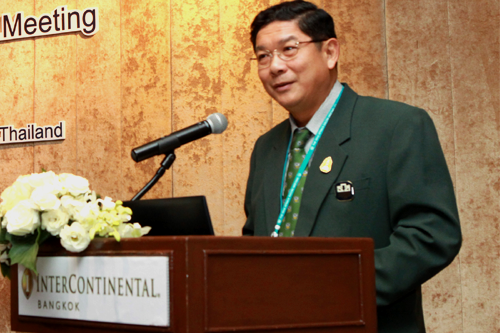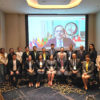Mr. Luck Wajananawat President of Bank for Agriculture and Agricultural Cooperatives (BAAC) Keynote speech at APRACA CEO Open Forum on Rural Finance, 26 February 2013, Intercontinental Hotel, Bangkok Mr. Kim Vada, Acting APRACA Chairman and Deputy Director General of National Bank of Cambodia Mr. Won Sik Noh, APRACA Secretary General APRACA EXCOM members Distinguished guests,
Mr. Luck Wajananawat
President of Bank for Agriculture and Agricultural Cooperatives (BAAC)
Keynote speech at APRACA CEO Open Forum on Rural Finance, 26 February 2013, Intercontinental Hotel, Bangkok
Mr. Kim Vada, Acting APRACA Chairman and Deputy Director General of National Bank of Cambodia
Mr. Won Sik Noh, APRACA Secretary General
APRACA EXCOM members
Distinguished guests, ladies and gentlemen
Mr. SHITANGSHU K SUR CHOWDHURY
Deputy Governor, Bangladesh Bank
Good morning
It is my great pleasure and honor to welcome you on behalf of Bank for Agriculture and Agricultural Cooperatives (BAAC) to APRACA CEO Open Forum on Rural Finance and the 62nd APRACA EXCOM Meeting in Bangkok and Phuket on February 26 – March 1, 2013. Mr.Kim Vada, Please give my regards to Mr.Pal Buy Bunnang and my best wish for him to get well soon.
Firstly let me express my sincere gratitude to APRACA chairman and EXCOM members for granting BAAC permission to host this important event and thank Mr. Won Sik Noh, APRACA Secretary General, for inviting me to deliver the keynote speech at today’s APRACA CEO Open Forum. I am pleased to learn that there will be 5 speakers to address their issues, and I hope that the information shared at this forum will be of value to participants and definitely will help enhancing better understanding among APRACA members with regard to their current situation, immerging issues and future challenges that we are going to face.
Ladies and gentlemen
It is a common place that countries with numerous populations engaging in agriculture usually face similar problems. Those who live in rural areas are important in their capacity as producers of food, but a great number of them are still poor, lack of access to financial services, with mounting debts and hardly be self-dependent. Different countries may have different approaches and stages of development to address those issues and to help bridge the gap between urban resident and rural households and between big companies and small entrepreneurs. Let me share with you BAAC’s experiences and parts of its accomplishments.
2013 is the year BAAC advances into its 47th anniversary of operation. We are proud of our prominent role of rural finance to become the most important and the only rural financial institution contributed to the sustainable rural economy of the country. BAAC has been doing successfully in reducing problems of informal money market, enhancing access to financial services of rural populations through promotion of rural finance. Over the past, we have consistently emphasized on agriculture and rural
finance mandated by the government, during which time we have faced major challenges and gone through a series of changes to adapt ourselves.
For overall performance, as of November 2012, BAAC recorded total assets of 1,150,000 million Baht, the highest since its establishment. The growth of BAAC assets is mainly due to growth of lending as a result of greater improvement of access to rural finance with an increase of 23.37 % from previous year to reach a total amount of 850,000 million Baht. Thanks to BAAC intensive network. On repayment, even though rural lending involved high risk, BAAC is able to maintain it Non Performance Loan at a low rate of 5.81 % and we are targeting to further reduce it to 4.5 % by the end of year.
Nowadays, BAAC’s outreach is 6.72 million farm households or 92.7 % of total farm households in Thailand. The success lies on the extensive and highly decentralized network system established in early year. An important expansion of its operation network has undertaken from late 1980s. By now, BAAC’s network consists of 77 provincial offices, 1,082 branches, and 979 field offices. Field offices serve as the most important outreach units and contact points to rural clients, while business development officers represent “front line” with respect to BAAC linkages to the farmers. They are responsible for following up the use of loans, training of the farmers and must overcome any obstacle to timely loan repayment. The closely monitoring coupled with Joint Liability Group (JLG) lending mechanism contributed much to the high percentage of loan repayment. JLG concept dates back to the foundation of BAAC in 1966 and has become a key factor for the success of BAAC and the trade mark of BAAC lending operation ever since. It also has been widely adopted elsewhere.
Ladies and gentlemen,
The aftermath of the 1997 financial crisis I recalled a huge and unrealized loss in BAAC due to currency devaluation. Moreover, an adverse effect of the economic melt-down in that year caused also a sharp increase in non-performing loans in its portfolio. In order to bring BAAC back on track, it took us a lot of effort including proper financing as well as recapitalization plans. As part of the plans, BAAC has committed itself to a more balanced funding policy focusing on local saving mobilization and it has now adopted a risk management practice based on international accounting standards.
30 years back, BAAC relied on government budget, borrowing from central bank, borrowing from overseas and the so called “forced deposits from the commercial banks” under the rural credit policy of the central bank of Thailand. Now BAAC funding structure inherited from the early years that acted as a recipient of government financial resources or foreign borrowings has changed as a result of lesson learned from the crisis. BAAC now is responsible for securing large volume of resources from low income people as well as urban residents and has gradually built up its own deposit base and become now self-reliant in fund raising. Deposits become the main source of BAAC fund accounting for 84.06% of the total. As a result, BAAC deposit is now reaching its unprecedented record of 920,000 million Baht. The challenge of BAAC now is to mobilize sufficient fund for the continuous and rapid growth of credit operation, an average growth of 12.6 % in the past 5 years. Among other business plans, BAAC is to expand it branch network in big cities like Bangkok to mobilize more fund. Thirty more branches are to be setup in Bangkok on top of its existing 20 branches for the purpose and to install 1,300 ATMs throughout the
country. Effort has also been made to re-brand and build image associated with green BAAC as to communicate BAAC’s social responsibility.
Ladies and gentlemen,
Since it establishment in 1966, BAAC has struggled for an amendment of BAAC Charter in many occasions and been successful for the move in order to obtain permissions to expand its lending operation and client coverage to pursue the mission of rural development. Now, we are able to provide financial services to support non-farmer clients in rural areas – the shift from the early stage of an agricultural bank providing solely small production loan, credit in kind, to a full-fledged rural development bank serving wider target groups of individual farmers, farmer institutions, entrepreneurs, local administration, village fund etc.
On technological part, BAAC has invested heavily to revamp its ICT platform to help reduce the problems of heavy workload and cost of reaching millions of rural borrowers, This also enable a more effective management information system, product design and management before developing more sophisticated technological solutions like mobile phone banking ready for future growth in a more intense competition environment.
Ladies and gentlemen
It is generally known that at present the world societies are facing dramatic changes. These include social and environmental changes caused by human activities. One of the most obviously hit has been the climate changes, the so-called global warming, which affects agricultural production. This, together with the effect of rapid growth of the world population would inevitably have a huge impact on Food, Fuel, and Forest. Food will be scarcer since the productive land dwindled and less productivity from the global warming effect. Whilst fossil fuel will ultimately be scarcer until its price would become unaffordable by laymen. Therefore, alternative source that is fuel from plants need to be more in use. The most impact would certainly be on the already scarce food since the limited productive land needs to be set aside for crop of alternative energy. We will see more forest encroachment, which in turn have a great impact on more severe global warming and less sources of water. The vicious cycle would be endless.
As Thailand plays an important role in both world food production and domestic bio- fuel production. Therefore, BAAC has a conscious aim to put a good balance between the support for food and bio-fuel production without deforestation. We strongly adhere to His Majesty the King’s Sufficiency Economy Philosophy of moderation, reasonableness, and resilience to change to our new way of life, farming, and doing business.
BAAC has been trying different approaches for rural finance. We aim to go beyond savings and loans to reach sustainable development by adopting the concept of credit plus technical assistance and value chain finance to ensure that all actors in the value chain are taken care of. And as agriculture is increasingly commercialized, it will make more sense to lend to a market linked business where small holders can participate in marketing of their produces for value added. Agricultural Marketing Cooperatives (AMCs) of BAAC Clients can be seen as buyer driven value chain business model that BAAC help put in place for linking finance to the value chain and securing inputs and market of agricultural produces. Now there are 76 AMCs serving BAAC clients. One of the success cases of value chain finance is the Wang Nam yen
dairy cow cooperative that BAAC has been adapting finance to efficiently fit the chain and all its actors from producers at farm to the coop itself – the marketer of finished products that is the sterilized milk. In this case, the coop is an important provider milk or processer.
I would like to cite here an example of successful sustainable farming that can be seen as a producer driven farming models, the case of strawberry farm revitalization. In 2009, a group of strawberry growers in the north suffered as a result of production losses due to the outbreak of epidemic and heavy use of chemical. All parties concerned, include farmers, agricultural specialists, academics, researchers, scientists, related government agencies, and BAAC convened to identify the causes of problem and finally they come up with solution for rehabilitating the strawberry production in a more environmentally friendly and sustainable way by shifting their farm practice to organic farming. BAAC, accordingly extended loans for construction of greenhouse and laboratory for advanced production of strong and uninfected breeding shoots. Following the adoption of new techniques, with strong determination, those farmers have worked harder and learned more. Their strawberry production and quality have greatly improved. In addition, BAAC is seeking farmers who are outstanding in their farm career, the so-called “Smart Farmer” to serve as teachers and transfer of knowledge to others and encouraging more farmers to invest loan proceedings in pro-environmental activities and to increase agricultural productivities through applying harmless local wisdoms.
Ladies and gentlemen
Nowadays, with globalization comes great opportunity and challenges. In this connection, I urge all of you to be well prepared for these changes and seek cooperation to address the challenges to ensure that agricultural sectors will be viable and sustainable. One of the prominent incidents in this region is the economic integration of ASEAN in 2015. Rural finance institution as an integral part of the society has a role to play in the development of economic integration. There are areas in which we can cooperate to make the region a common market and production hub by making use of individual strength of particular crop such as rice, rubber in research, production, processing, and marketing in which time transfer of knowledge, production factors, labor and capital can be done freely. In financial services customers are expected to demand more and diversified credits vital to business expansion. Rural finance institutions need to be well connected for more business opportunities to leverage the ability to uphold its competitiveness in the face of environmental changes.
Finally, I highly appreciate your participation and contribution to this CEO Open Forum. I wish you all a very successful meeting, and a very memorable and pleasurable stay in Bangkok and Phuket where you will have an opportunity to explore the beauty of Andaman pearl and see the rural finance landscape of BAAC there. Thank you















